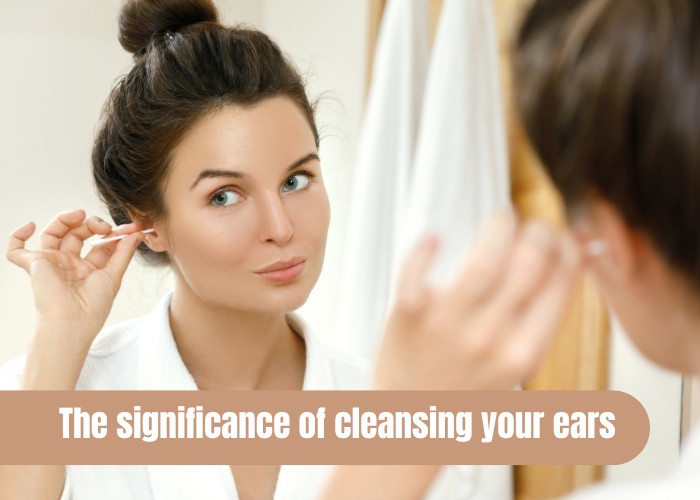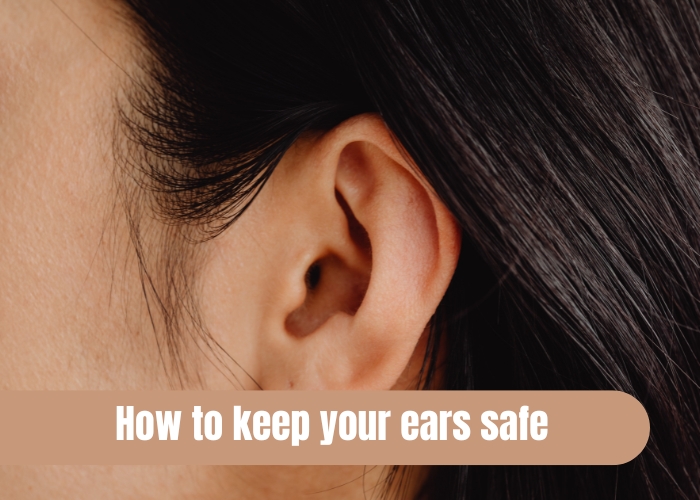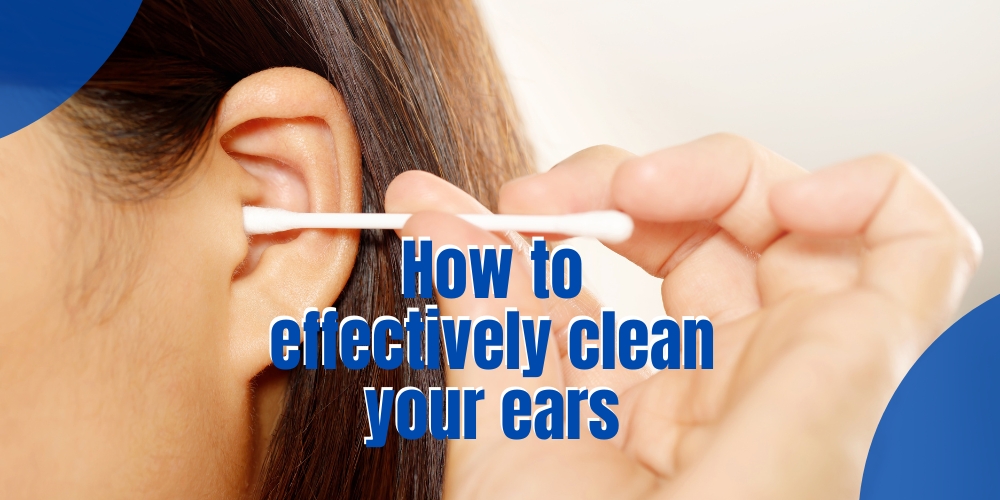Since your ears are fragile organs, neglecting to take proper care of them could cause damage and hearing loss. But doing it incorrectly might also harm your hearing. People frequently use cotton swabs to remove earwax accumulation from their ears. However, they are sometimes better products for ear care. Let’s talk about how to clean your ears effectively.
Why Is There Earwax on You?
Your body naturally produces cerumen, or earwax, as medical professionals may refer to it. It keeps your ears lubricated and protected. You would probably have dry, itchy ears if you didn’t have earwax. Because of its antimicrobial qualities, your ears can actually clean themselves. Earwax functions as a filter for your ears, capturing and preventing foreign objects like dust and debris from entering deep inside. Old earwax helps to travel from the ear canal to the ear aperture when you chew and move your jaw. It typically dries up and falls out there. However, the exterior portion of your ear canal is where earwax is produced, not the deep region.
Therefore, the most common cause of an earwax obstruction against your eardrum is that you attempted to clean your ears using a cotton swab or similar tool, which caused the wax to become lodged deeper.
Comprehending Earwax
Prior to beginning the cleaning procedure, it’s critical to comprehend cerumen, another name for earwax. A naturally occurring material called earwax is secreted by glands in the ear canal and serves to lubricate and shield your ears. In addition to having antimicrobial qualities, it collects dust and particles, keeping them from getting to the auditory nerve.
Earwax progressively travels from the ear canal to the outer ear, where it ultimately flakes off or is washed away; thus, in most circumstances, your ears can clean themselves.
Is It Time to Clean Your Ears?
Not in the ideal scenario. Cleaning your ear canals shouldn’t be necessary. However, you may develop cerumen impaction if much earwax accumulates and begins to produce symptoms or if it prevents your doctor from doing a thorough ear examination. This can occur in one or both ears and indicates that your ear canal is entirely clogged with wax.
Ear wax can accumulate if you use cotton buds or other things in your ears, wear hearing aids, or experience problems following ear surgery.
The following are signs of cerumen impaction:
- You may have fullness or pain in your ears.
- sensing a clog in your ear, partial hearing loss that becomes worse over time
- Tinnitus is the term for ringing in the ears.
- odour, discharge, or itching from your ears
- Coughing
Although uncommon, this type of earwax accumulation is possible. Give your doctor a call if you encounter any of the symptoms mentioned above. They are able to inspect your ears, identify the problem, and suggest earwax removal treatment.
Using a specialised tool, your doctor can examine your ear canal and extract any earwax using tiny tools, suction, or irrigation.
How to Keep Your Ears Clean
It’s normal to feel the need to clean your ears, particularly if they seem full or you’re having trouble hearing. Although you should consult a doctor, such as an audiologist or ear, nose, and throat specialist, for serious hearing difficulties, there are a few things you can do to safely and correctly clean your ears.
- Mix hydrogen peroxide and water in equal amounts to make a cleaning solution. Earwax can be broken down and softened by hydrogen peroxide, which speeds up its dissolution and exit from the ear. For wax buildup, you can also find an ear drop that is sold commercially.
- With your head tilted to one side, insert several drops of solution into the ear canal using an ear dropper. Before you lift your head, you should let the drops stay in your ear for a few minutes.
- Wipe away any residue that seeps out of your ear with a fresh tissue or wet washcloth. If any earwax is visible inside the ear, it can also be removed using a wet washcloth.
The significance of cleansing your ears

It’s quite natural and beneficial to have some earwax in your ear canals. That being said, it’s critical to clear it out if it accumulates and begins to cause symptoms like hearing loss or lightheadedness.
An impacted buildup of earwax can result in an ear infection. Furthermore, you should confirm that the symptoms you’re having are due to wax and not something more serious, like fluid retention or hearing loss, that has to be seen by a doctor.
Things to stay away from
Many folks don’t require regular ear cleanings. The wax needs to be self-sufficient. The use of tiny objects, such as cotton swabs, bobby pins, or napkin edges, may cause the wax to be pushed far into the ear canal. It can be affected if wax accumulation occurs. Most doctors will advise against inserting anything smaller than your elbow inside your ear. To put it another way, avoid using cotton swabs, sharp objects, or anything else that can harm your eardrum and cause long-term hearing loss.
Irrigating your ears is not something you should try if:
You may have a hole in your eardrum, you have tubes in the afflicted ear, you have diabetes, or your immune system is weakened. Another alternative you should not choose is ear candles. Wax is drawn upward by suction from the ear canal using the long, cone-shaped candles that are lit on fire. You could burn yourself, or you might inadvertently get candle wax in your ear.
Difficulties
Your symptoms may worsen if you don’t treat a blockage that develops. Additional ear discomfort or possibly hearing loss could occur. Additionally, the buildup of wax may make it challenging for your doctor to look inside your ear and make additional diagnoses.
When to call a physician
Earwax obstruction symptoms include:
Decreased or muddled hearing, fullness in the ear, and earache. They might also be an indication of an infection or another medical issue. To find out if wax buildup is the cause of your symptoms or something else entirely, a doctor can examine the inside of your ears.
Adult ear infections manifest as the following symptoms:
middle ear pain, fluid drainage, and hearing impairment
The signs of an ear infection usually appear quickly. Don’t attempt self-treating if you get pain and discharge from your ears. As soon as possible, schedule a visit with a physician to receive a correct diagnosis and, if required, medicine.
How to keep your ears safe

In addition to cleaning your ears, take note of these pointers to preserve them and guarantee clear hearing for years to come:
- Keep tiny items out of your ears. Anything smaller than your elbow shouldn’t be placed inside your ear canal as this could injure your eardrum or result in wax impaction.
- Reduce how much loud noises you are exposed to. When the noise level becomes unbearable, put on safety goggles or earplugs.
- When utilising headphones, take short breaks from time to time and make sure your music is loud enough for no one else to hear. Avoid turning up the audio system in your automobile too loudly.
- After swimming, pat dry your ears to avoid the swimmer’s ear. To help remove any remaining water, tilt your head and wipe the outside of the ear with a handkerchief.
- If you use any drugs, pay attention to any changes in your hearing. See a doctor if you have any changes, dizziness, or ringing in the ears.
- If you have an ear injury, experience sudden discomfort, or lose your hearing, get medical attention right once.
In summary
It’s important to use gentle cleaning methods and refrain from sticking things in your ear canal when cleaning your ears. Your ears mostly manage earwax on their own; cleaning should only be done when absolutely required. Seek advice from a medical expert if you have any worries regarding earwax accumulation or ear health.

